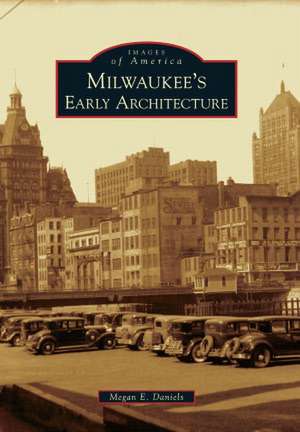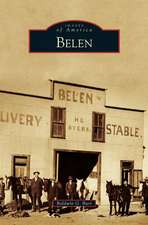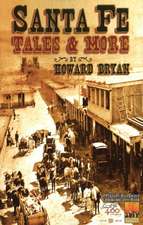Milwaukee's Early Architecture: Images of America (Arcadia Publishing)
Autor Megan E. Danielsen Limba Engleză Paperback – 30 iun 2010
Din seria Images of America (Arcadia Publishing)
-
 Preț: 129.71 lei
Preț: 129.71 lei -
 Preț: 129.71 lei
Preț: 129.71 lei -
 Preț: 130.74 lei
Preț: 130.74 lei -
 Preț: 129.71 lei
Preț: 129.71 lei -
 Preț: 125.22 lei
Preț: 125.22 lei -
 Preț: 130.74 lei
Preț: 130.74 lei -
 Preț: 130.74 lei
Preț: 130.74 lei -
 Preț: 130.92 lei
Preț: 130.92 lei -
 Preț: 132.42 lei
Preț: 132.42 lei -
 Preț: 115.50 lei
Preț: 115.50 lei -
 Preț: 130.97 lei
Preț: 130.97 lei -
 Preț: 129.49 lei
Preț: 129.49 lei -
 Preț: 115.72 lei
Preț: 115.72 lei -
 Preț: 126.07 lei
Preț: 126.07 lei -
 Preț: 131.55 lei
Preț: 131.55 lei -
 Preț: 127.30 lei
Preț: 127.30 lei -
 Preț: 115.72 lei
Preț: 115.72 lei -
 Preț: 131.16 lei
Preț: 131.16 lei -
 Preț: 126.26 lei
Preț: 126.26 lei -
 Preț: 132.42 lei
Preț: 132.42 lei -
 Preț: 130.97 lei
Preț: 130.97 lei -
 Preț: 130.97 lei
Preț: 130.97 lei -
 Preț: 129.71 lei
Preț: 129.71 lei -
 Preț: 126.26 lei
Preț: 126.26 lei -
 Preț: 130.97 lei
Preț: 130.97 lei -
 Preț: 126.26 lei
Preț: 126.26 lei -
 Preț: 131.79 lei
Preț: 131.79 lei -
 Preț: 118.36 lei
Preț: 118.36 lei -
 Preț: 125.22 lei
Preț: 125.22 lei -
 Preț: 126.67 lei
Preț: 126.67 lei -
 Preț: 130.74 lei
Preț: 130.74 lei -
 Preț: 135.25 lei
Preț: 135.25 lei -
 Preț: 132.18 lei
Preț: 132.18 lei -
 Preț: 116.31 lei
Preț: 116.31 lei -
 Preț: 130.97 lei
Preț: 130.97 lei -
 Preț: 132.18 lei
Preț: 132.18 lei -
 Preț: 130.92 lei
Preț: 130.92 lei -
 Preț: 131.15 lei
Preț: 131.15 lei -
 Preț: 131.15 lei
Preț: 131.15 lei -
 Preț: 130.74 lei
Preț: 130.74 lei -
 Preț: 130.97 lei
Preț: 130.97 lei -
 Preț: 130.97 lei
Preț: 130.97 lei -
 Preț: 130.74 lei
Preț: 130.74 lei -
 Preț: 131.15 lei
Preț: 131.15 lei -
 Preț: 130.75 lei
Preț: 130.75 lei -
 Preț: 130.97 lei
Preț: 130.97 lei -
 Preț: 127.08 lei
Preț: 127.08 lei -
 Preț: 129.71 lei
Preț: 129.71 lei -
 Preț: 176.03 lei
Preț: 176.03 lei -
 Preț: 116.13 lei
Preț: 116.13 lei
Preț: 131.79 lei
Nou
Puncte Express: 198
Preț estimativ în valută:
25.24€ • 26.03$ • 20.91£
25.24€ • 26.03$ • 20.91£
Carte indisponibilă temporar
Doresc să fiu notificat când acest titlu va fi disponibil:
Se trimite...
Preluare comenzi: 021 569.72.76
Specificații
ISBN-13: 9780738584119
ISBN-10: 0738584118
Pagini: 127
Dimensiuni: 169 x 235 x 8 mm
Greutate: 0.31 kg
Editura: Arcadia Publishing (SC)
Seria Images of America (Arcadia Publishing)
ISBN-10: 0738584118
Pagini: 127
Dimensiuni: 169 x 235 x 8 mm
Greutate: 0.31 kg
Editura: Arcadia Publishing (SC)
Seria Images of America (Arcadia Publishing)
Notă biografică
Images from Milwaukee's Historic Preservation Commission and the Milwaukee Public Library were selected by author Megan Daniels to narrate Milwaukee's architectural history as it responded to the city's development and historical events.
Descriere
Initially dominated by simple renditions of East Coast architecture, Milwaukee developed from three pioneer settlements, those of Solomon Juneau, Byron Kilbourn, and George Walker--three hubs from which three villages radiated outward into one city. Following the Civil War, Milwaukee's growth at the onset of the Industrial Era afforded the city a fanciful array of Victorian streetscapes. The 1890s followed with an era of ethnic architecture in which bold interpretations of German Renaissance Revival and Baroque designs paid homage to Milwaukee's overwhelming German population. At the turn of the century, Milwaukee's proximity to Chicago influenced the streetscape with classicized civic structures and skyscrapers designed by Chicago architects. World War I and the ensuing anti-German sentiment, as well as Prohibition, inevitably had adverse effects on "Brew City." By the 1920s, Milwaukee's architecture had assimilated to the national aesthetic, suburban development was on the rise, and architectural growth would soon be stunted by the Great Depression.













